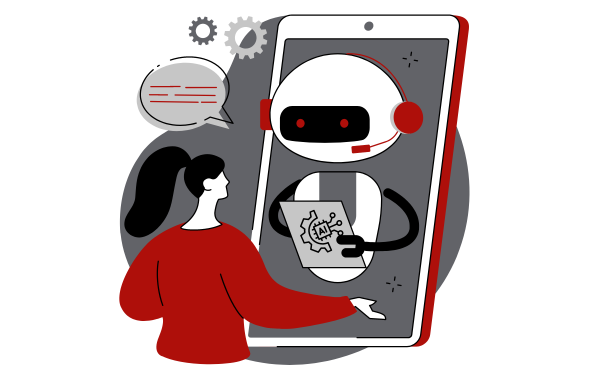How is AI anticipated to influence the future of the physical retail shopping experience?
In recent years, the retail industry has witnessed a profound transformation with the arrival of Artificial Intelligence (AI). AI has rapidly emerged as a key driver of innovation and growth, revolutionising the way consumers shop in physical retail stores. At its core, AI refers to the ability of machines to simulate human intelligence, enabling them to perform tasks that traditionally required human intervention. In the context of retail, AI encompasses a wide range of technologies and applications that have the potential to enhance every aspect of the shopping experience.
The impact of AI on physical retail shopping
The impact of AI on physical retail shopping has been nothing short of transformative. Gone are the days when consumers had to navigate crowded aisles, search for products, and wait in long queues to make a purchase. With the integration of AI technologies, retailers can now offer a more streamlined and personalised shopping experience. AI-powered systems can analyse vast amounts of data, such as customer preferences, purchase history, and real-time inventory levels, to provide relevant and timely recommendations. This not only helps customers find products they are likely to be interested in but also increases the chances of upselling and cross-selling.
Furthermore, AI has greatly improved inventory management and supply chain optimisation in physical retail stores. By leveraging machine learning algorithms, retailers can accurately forecast demand, minimise overstocking and stockouts, and optimise the allocation of resources. This ensures that the right products are available at the right time and in the right quantities, leading to improved customer satisfaction and increased sales. Additionally, AI-powered robots and automated systems can be deployed to streamline the supply chain process, from warehouse operations to last-mile delivery, reducing costs and improving efficiency.
The future of AI in physical retail shopping
The future of AI in physical retail shopping is filled with exciting possibilities. As technology continues to advance, we can expect AI to play an even more prominent role in shaping the retail landscape. For instance, AI-powered systems could enable fully automated stores, where customers can enter, select products, and make payments without any human intervention. This would provide a seamless and frictionless shopping experience, reducing costs and improving efficiency.
Additionally, the integration of AI with other emerging technologies, such as Internet of Things (IoT) and blockchain, could create new opportunities in retail. For example, IoT devices could collect real-time data from various touchpoints, such as smart shelves and wearables, enabling retailers to gain deeper insights into customer behaviour. Blockchain technology could enhance supply chain transparency and traceability, allowing customers to verify the authenticity and origin of products.
AI technologies transforming the shopping experience
AI technologies have revolutionised the shopping experience by introducing a new level of personalisation and convenience. One of the most notable applications of AI in retail is personalised recommendations. AI algorithms analyse customer data, such as past purchases, browsing behaviour, and demographic information, to generate tailored product recommendations. This not only helps customers discover new products but also increases the likelihood of making a purchase. Retailers can also leverage AI-powered chatbots to provide personalised customer assistance and support, enhancing the overall shopping experience.
AI-driven inventory management and supply chain optimisation
AI-driven inventory management and supply chain optimisation have become essential for retailers looking to stay competitive in today’s fast-paced retail landscape. Through the use of machine learning algorithms, retailers can accurately forecast demand, optimise inventory levels, and automate replenishment processes. AI-powered systems can analyse historical sales data, market trends, and external factors to generate accurate demand forecasts, ensuring that the right products are available at the right time and in the right quantities. This not only improves customer satisfaction but also reduces costs associated with overstocking and stockouts.
Moreover, AI can optimise the entire supply chain process, from procurement to last-mile delivery. By analysing data from various sources, such as weather forecasts, traffic patterns, and supplier performance metrics, AI algorithms can identify bottlenecks, optimise routes, and minimise transportation costs. Additionally, AI-powered robots and automated systems can be used to streamline warehouse operations, improving efficiency and reducing human errors. This allows retailers to deliver products to customers faster and at a lower cost, ultimately enhancing the overall shopping experience.
AI-driven customer service and chatbots
AI-driven customer service and chatbots have reformed the way retailers interact with their customers. Chatbots, powered by AI, can handle a wide range of customer inquiries and provide real-time assistance, 24/7. This not only improves customer satisfaction but also reduces the workload on customer service teams, allowing them to focus on more complex and high-value tasks.
AI-driven customer service systems can analyse customer sentiment and feedback, enabling retailers to proactively address issues and improve the overall customer experience. By monitoring social media, online reviews, and customer surveys, AI algorithms can identify patterns and trends, highlighting areas for improvement. This feedback loop helps retailers understand customer preferences, identify pain points, and make data-driven decisions to enhance the shopping experience.
#AI
#RetailTech
#CustomerExperience
#CX




